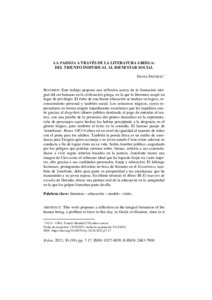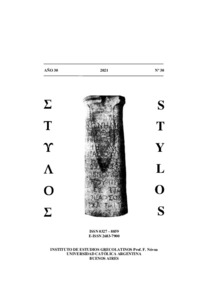Por favor, use este identificador para citar o enlazar este ítem:
https://repositorio.uca.edu.ar/handle/123456789/13390| Título: | La paideia a través de la literatura griega : del triunfo individual al bienestar social | Autor: | Frenkel, Diana L. | Palabras clave: | FILOSOFIA ANTIGUA; EDUCACION; HISTORIA DE LA EDUCACION; CULTURA CLASICA; LITERATURA | Fecha de publicación: | 2021 | Editorial: | Pontificia Universidad Católica Argentina. Facultad de Filosofía y Letras. Instituto de estudios grecolatinos "Prof. F. Nóvoa" | Cita: | Frenkel, D. L. La paideia a través de la literatura griega : del triunfo individual al bienestar social [en línea]. Stylos. 2021, 30. doi: 10.46553/sty.30.30.2021.p7-17. Disponible en: https://repositorio.uca.edu.ar/handle/123456789/13390 | Resumen: | Resumen: Este trabajo propone una reflexión acerca de la formación integral del ser humano en la civilización griega, en la que la literatura ocupó un
lugar de privilegio. El éxito de una buena educación se traduce en logros, reconocimiento personal y también social. Los concursos trágicos, cuyos espectadores no tenían ningún impedimento económico que les impidiera asistir gracias al theorikón (dinero público destinado al pago de entradas al teatro), son una prueba de la presencia del género dramático en la representación de personajes cuyos hechos los habían precipitado a la desgracia en el género trágico, pero también al éxito en la comedia. El famoso pasaje de
Aristófanes Ranas 1053-6 ubica en un nivel de igualdad al maestro de niños con el poeta para los adultos. También la poesía lírica es un medio de enseñanza para Teognis quien aconseja a su joven amado Cirno cómo adecuar su conducta a fin de lograr éxito en su vida. Solón, hombre político, angustiado por los peligros que podrían cernirse sobre Atenas, exhorta a sus conciudadanos
a vivir según criterios basados en la justicia. Jenofonte recrea una
imagen de Ciro como el soberano ideal que ha logrado forjar un vasto imperio, ello gracias a sus cualidades personales, linaje y educación. El labriego
Iscómaco, protagonista del relato en boca de Sócrates en el Económico, también de Jenofonte, debe gran parte su prosperidad a las enseñanzas que ha transmitido a su joven esposa. En último término el Mimo III El maestro de escuela de Herodas ofrece una pintura real de la educación en la antigüedad en la que los golpes formaban parte de ella. Abstract: This work proposes a reflection on the integral formation of the human being, a problem in force to this day, in Greek civilization, since in it Stylos. 2021; 30 (30); pp. 7-17; ISSN: 0327-8859; E-ISSN: 2683-7900 8 literature had to fulfill a privileged place. The success of a good education translates into personal and social achievement and recognition. The tragic contests, whose spectators did not have any economic impediment that prevented them from attending thanks to the theorikón (public money destined to the payment of tickets to the theater), are proof of the presence of the dramatic genre in the representation of characters whose events had precipitated them to misfortune in the tragic genre but also success in comedy. The famous passage from Aristophanes Frogs 1053-6 places the teacher of chil- dren on a level of equality with the poet for adults. Lyric poetry is also a teaching tool for Theognis who advises his young lover Cyrnus how to adapt his behavior in order to achieve success in his life. Solon, a politician, anguished by the dangers that could loom over Athens, exhorts his fellow citizens to live according to criteria based on justice. Xenophon recreates an image of Cyrus as the ideal sovereign who has managed to forge a vast empire, thanks to his personal qualities, lineage and education. Ischomachus, main character of the story in the mouth of Socrates in the Oeconomicus also by Xenophon, owes much of his prosperity to the teachings that he has transmitted to his young wife. Ultimately, Herodas's Mime III "The Teacher" offers a real painting of education in antiquity in which blows were part of it. |
URI: | https://repositorio.uca.edu.ar/handle/123456789/13390 | ISSN: | 0327-8859 (impreso) 2683-7900 (online) |
Disciplina: | LITERATURA | DOI: | 10.46553/sty.30.30.2021.p7-17 | Derechos: | Acceso abierto | Fuente: | Stylos. 2021, 30 |
| Aparece en las colecciones: | STY - 2021 nro. 30 |
Ficheros en este ítem:
| Fichero | Descripción | Tamaño | Formato | |
|---|---|---|---|---|
| paideía-literatura-griega-triunfo.pdf | 193,67 kB | Adobe PDF |  Visualizar/Abrir | |
| stylos30_portada.pdf | 128,89 kB | Adobe PDF |  Visualizar/Abrir |
Visualizaciones de página(s)
91
comprobado en 27-abr-2024
Descarga(s)
207
comprobado en 27-abr-2024
Google ScholarTM
Ver en Google Scholar
Altmetric
Altmetric
Este ítem está sujeto a una Licencia Creative Commons

